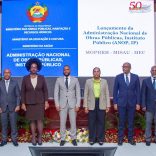Mozambique: New institute created to enhance rigor in public infrastructure construction
IMF open to talks about financial support – AIM

Photo: DW
The International Monetary Fund (IMF) says it is willing to talk with the Mozambican government about a possible programme of financial support, should the government request such a discussion.
Ricardo Velloso, the head of an IMF staff team that visited Mozambique for a week earlier this month, told a Maputo press conference on Wednesday “We are willing to work with Mozambique in the closest and most convenient way possible. If the government is interested in talking about a possible programme of financial support, we are open to such a request”.
ALSO READ: Mozambique: IMF may consider new medium-term financial package, says Selassie -WATCH
For as long as the government did not make this request, he added, the IMF would continue supporting the country in the manner deemed most convenient.
The last IMF programme came to an abrupt end in April 2016, when the true extent of Mozambique’s “hidden debts” became known. The government then admitted that its predecessor, under President Armando Guebuza, in 2013 and 2014, had guaranteed loans of over two billion US dollars obtained by three fraudulent, security related companies, Ematum (Mozambique Tuna Company), Proindicus and MAM (Mozambique Asset Management) from the banks Credit Suisse and VTB of Russia.
Since all three companies were producing almost no revenue, there was no way they could repay the loans, and so the Mozambican state became liable for the full two billion dollars.
The IMF accused the government of concealing the country’s true foreign debt situation, and suspended its programme. The group of 14 donors who provided direct support to the Mozambican state budget suspended their disbursements, and to this day that form of aid has not resumed.
ALSO READ: Listen: Mozambican analysts question resumption of IMF support to state budget
“Obviously, in the case that talks are programmed, we will have to take the matter (of financial aid) to our Board of Directors for approval”, said Velloso. “But the opening is there, if this is the path the Mozambican authorities wish to take”.
Since the suspension of the programme in 2016, the IMF has made a series of recommendations and it has been following their implementation in a series of what it describes as routine visits.
Velloso said that, due largely to the two cyclones that hit Mozambique in March and April, the annual GDP growth rate, in the second quarter of this year, slowed to 2.25 per cent. However inflation had remained low and the exchange rate was stable.
Velloso’s mission was optimistic about the future, claiming that “the outlook for 2020 is for a strong rebound in economic activity”, with the growth rate rising to 5.5 per cent, “supported by post-cyclone reconstruction efforts, a recovery in agriculture and economic stimulus from further gradual easing of monetary conditions and clearing of domestic payments arrears to suppliers”.
The IMF also expects the construction sector to be boosted by investments in the liquefied natural gas (LNG) mega-projects.
Velloso’s mission recommended “gradual fiscal consolidation over the medium term with a view to eliminating the primary fiscal deficit by 2022, while protecting or increasing well-targeted social spending”.
Velloso claimed “there is ample room for the Bank of Mozambique to continue easing monetary policy, given well-anchored inflation expectations, provided this easing is supported by a prudent fiscal policy stance”. The mission “welcomed the Bank of Mozambique’s strong commitment to maintain a flexible exchange rate and safeguard financial sector stability”.
The mission welcomed the efforts of the Attorney-General’s Office to hold accountable those responsible for the Ematum, Proindicus and MAM loans, “as well as the government’s initiatives to fight corruption and strengthen transparency”.
ALSO READ: IMF staff concludes visit to Mozambique – Press Release













Leave a Reply
Be the First to Comment!
You must be logged in to post a comment.
You must be logged in to post a comment.